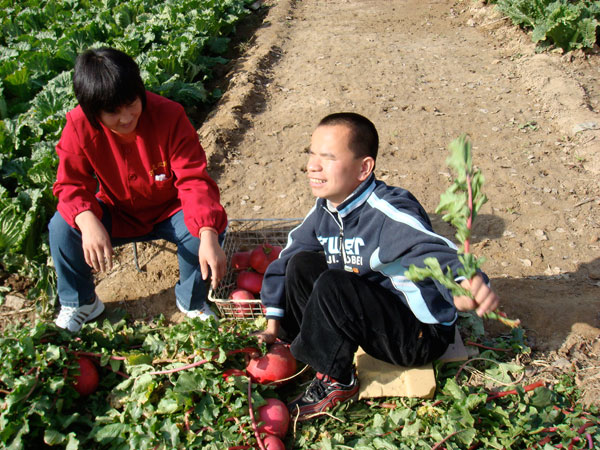All Family Here
Updated: 2011-11-20 08:40
By Mike Peters (China Daily)
|
|||||||||
"We thought blindness was a situation we could learn about, and that it was within our ability to care for," he says.
|
 |
|
Sam, a Bethel resident, learns about harvesting vegetables at Bethel's farm. [Photo/China Daily] |
So the couple headed for Lang Fang, southeast of the capital, where they could buy a bigger house, then took in two orphans from the same facility where they found David. They bounced to a second house, then a third and fourth as the number of kids - and a school - grew under their roof.
But their hearts and ideas were bigger, and so Guillaume went looking for land. And despite having no business management training - "I think some people just have this ability naturally" - he went into high gear for fund-raising.
Today, the seven-house Bethel compound sits on 7 green hectares in semi-rural Doudian, about an hour southeast of central Beijing. "We always had a dream to have a facility that was ecologically based," he says, waving at the two main fields of a farm that now supplies the kitchen pantry and provides income through produce sales. There are about 200 chickens ("we're selling eggs"), goats ("they're pretty useless we haven't developed the facilities you need to make cheese properly") and a series of garden-therapy plots ("we do the square-foot gardening to give kids that hands-on experience").
Making life real for the kids is always Job One.
"Blind kids who are mentally normal can become abnormal, even autistic, because they are shunned or treated as mentally deficient," says Guillaume. Avoiding that tragedy is top priority at Bethel, but the mission for those blind youngsters is life-long.
State-run orphanages are more proactive today about helping people with disabilities, he says, but the infrastructure isn't there and the needs are great. The Gauvains see the Bethel facility, where nearly 100 staff members include primary care-givers, as a first step. An outreach program would have "mini-Bethels" inside one State orphanage in every provice: the first will open in Zhengzhan, Henan province very soon. And the foundation is creating manuals, for parents as well as institutions, to develop a new sense of possibility for caring for kids with special needs.
"Now, when the children get all the way through the orphanage school," he says, "some places will have to move them directly to an elder-care facility. Sort of fast-forwarding their lives," he says with a rueful smile.
Traditionally there have been few alternatives for people who need special care and have no skills or job training.
"This is one reason we build houses for the residents here, not dormitories," he says. "They live in a family atmosphere (about a half-dozen students in each house). They have chores and other responsibilities in the house and at the school. They become proud of that very quickly."











